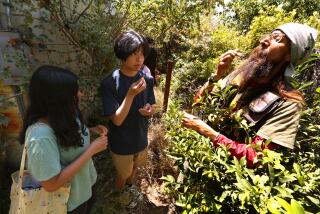The Next L.A. / Reinventing Our Future : CYBER SCHOOL: The New Community Center
- Share via
The campus of the future actually gets back to basics, to a time when schools were an integral part of a neighborhood. The educational environment would include: Expanded operating hours; various community services; time-saving technology; and the freedom of teachers, parents and administrators to custom tailor the academic programs to the individual school. The arrangement would not only make better use of scarce public resources, experts say, but also help combat the alienation that contributes to low student achievement and high dropout and crime rates.
NEIGHBORHOOD
To help the school in its role as the center of the community, the campus serves primarily students within the surrounding neighborhood. Some are bused to another school or attend from another neighborhood, but that is because their parents, under open enrollment rules, have requested that.
OPERATING HOURS
The school is open weekdays from early morning through evening, and for several hours on weekends to accommodate working parents and to enable community groups to meet on campus. The extended hours also give students more access to the library, computers, science labs and other study facilities. Teacher aides, many of them working on college degrees and credentials by day, staff the labs evenings and weekends.
GOVERNANCE
The principal, who was hired by a committee of parents, faculty and district administrators, operates the school with a lump sum, dispensed annually. A council of staff, parents and community members helps decide how the funds should be spent. Students are tested in academic subjects annually, with the schoolwide (not individual) results posted and analyzed by comparing them to state and national standards and to the achievement goals set by the school council at the start of each academic year.
ORGANIZATION
All age groups--from preschool through 12th graders--are clustered in a series of mini-schools on the same campus, enabling older youngsters to help with the younger ones and providing continuity for each student as he or she moves through the system. Contracts with colleges, private firms and other public schools allows students time away from the home campus for specialized courses or work experience.
TEACHING STAFF
A few highly paid master teachers head teams of instructors of various experience and pay levels; having several lower-paid aides and beginning teachers makes it possible for the school to have a 15-to-one student-adult ratio on its shoestring budget. The teams have time daily to plan and coordinate lessons, as well as help set longterm goals for their students. Teaching teams and students remain together for three years. The multi-lingual, racially diverse teaching staff mirrors the ethnic makeup of the students.
SERVICES
Under contracts with the state, county and a private hospital and funding from two local industries, the campus has immunization clinics, a nurse, a physician training for a career in family medicine, a social worker and a psychologist for students and their families. After daily instruction ends, these professionals also are available to other community members.
TECHNOLOGY
Computerized data on each student and staff member help streamline record-keeping, class assignments, and payroll. A central computer system enables the school to tie into state and district offices. School-trained parent volunteers do some of the electronic paperwork. Cable networks, computerized libraries and faculty workroom allow the campus to tap others’ resources. The school council has decided to splurge on providing enough laptop computers for every student from seventh grade up to check out for up to a month.
A Day in the Life of the School of the Future
6 a.m.: Day care center opens.
7 a.m.: Car pool to work. Tuesday--Orange group.
8:15 a.m.: School starts.
10:20 a.m.: Speaking English class for parents, room 18.
Noon: lunch.
12:15 p.m: Prenatal care clinic. School Health Center.
12:40 p.m.: Story-telling at school seniors center. Tuesday--3rd-grade, room 12, “Charlotte’s Webb”
2:35 p.m.: School ends.
2:40 p.m-7 p.m.: After-school care center open. Tuesday---9th-grade Junior Teachers club assisting until 5 p.m.
3:15: Intramural sports, grades 4 to 6. North field.
6 p.m.- 8 p.m.: Parenting class: “Helping Your Child with Homework.” Individual counseling. School Health Center.
6:15 p.m.- 7 p.m.: Childbirth class. School Health Center.
7 p.m.- 9:30 p.m.: Village coffee shop open, school cafeteria. Tuesday: folk dance lessons.
7:30 p.m.: School governing board meeting. Agenda: neighborhood carnival, recycling center report, school budget.
8 p.m.-9:30 p.m.: Speaking English class for parents.
10 p.m.: 10:45 p.m. Volunteer clean up crew. Tuesday: “Terry’s Tornadoes.” Meet at main office.
More to Read
Sign up for Essential California
The most important California stories and recommendations in your inbox every morning.
You may occasionally receive promotional content from the Los Angeles Times.













